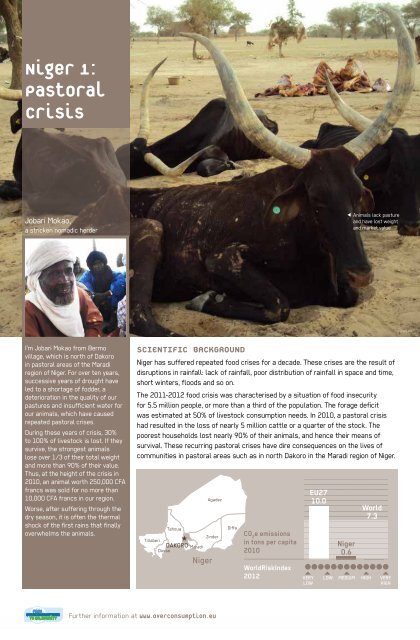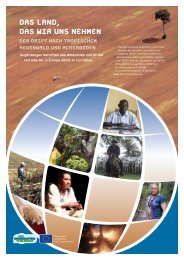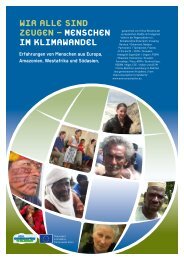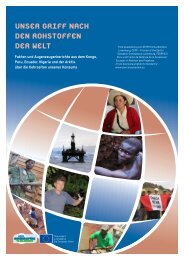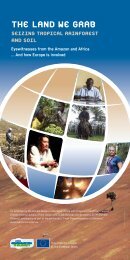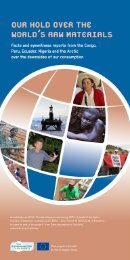WE ARE ALL WITNESSES - PEOPLE IN A CHANGING CLIMATE
The 24 panels of the "We are all witnesses - People in a Changing Climate" exhibition illustrate how climate change is already taking place in 16 countries in four countries.
The 24 panels of the "We are all witnesses - People in a Changing Climate" exhibition illustrate how climate change is already taking place in 16 countries in four countries.
You also want an ePaper? Increase the reach of your titles
YUMPU automatically turns print PDFs into web optimized ePapers that Google loves.
Niger 1:<br />
Pastoral<br />
Crisis<br />
Jobari Mokao,<br />
a stricken nomadic herder<br />
Animals lack pasture<br />
and have lost weight<br />
and market value<br />
© CESAO -PRN<br />
© CESAO -PRN<br />
I’m Jobari Mokao from Bermo<br />
village, which is north of Dakoro<br />
in pastoral areas of the Maradi<br />
region of Niger. For over ten years,<br />
successive years of drought have<br />
led to a shortage of fodder, a<br />
deterioration in the quality of our<br />
pastures and insufficient water for<br />
our animals, which have caused<br />
repeated pastoral crises.<br />
During these years of crisis, 30%<br />
to 100% of livestock is lost. If they<br />
survive, the strongest animals<br />
lose over 1/3 of their total weight<br />
and more than 90% of their value.<br />
Thus, at the height of the crisis in<br />
2010, an animal worth 250,000 CFA<br />
francs was sold for no more than<br />
10,000 CFA francs in our region.<br />
Worse, after suffering through the<br />
dry season, it is often the thermal<br />
shock of the first rains that finally<br />
overwhelms the animals.<br />
SCIENTIFIC BACKGROUND<br />
Niger has suffered repeated food crises for a decade. These crises are the result of<br />
disruptions in rainfall: lack of rainfall, poor distribution of rainfall in space and time,<br />
short winters, floods and so on.<br />
The 2011-2012 food crisis was characterised by a situation of food insecurity<br />
for 5.5 million people, or more than a third of the population. The forage deficit<br />
was estimated at 50% of livestock consumption needs. In 2010, a pastoral crisis<br />
had resulted in the loss of nearly 5 million cattle or a quarter of the stock. The<br />
poorest households lost nearly 90% of their animals, and hence their means of<br />
survival. These recurring pastoral crises have dire consequences on the lives of<br />
communities in pastoral areas such as in north Dakoro in the Maradi region of Niger.<br />
Niger<br />
Agadez<br />
Tahoua<br />
Zinder<br />
Tillaberi<br />
DAKORO Maradi<br />
Dosso<br />
Diffa<br />
CO 2<br />
e emissions<br />
in tons per capita<br />
2010<br />
15<br />
14<br />
13<br />
12<br />
11<br />
10<br />
9<br />
8<br />
7<br />
6<br />
5<br />
4<br />
3<br />
2<br />
1<br />
0<br />
WorldRiskIndex<br />
2012 VERY<br />
LOW<br />
EU27<br />
10.0<br />
Niger<br />
0.6<br />
World<br />
7.3<br />
LOW MEDIUM HIGH VERY<br />
HIGH<br />
Further information at www.overconsumption.eu


